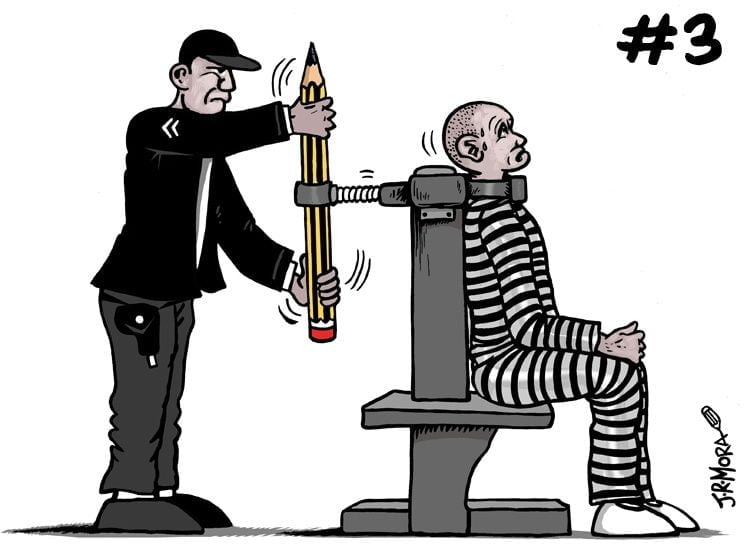
Altuna's strip from the weekly series "Es lo que hay (Reality)". Clarín of 8 June 2023.
Tabla de contenidos
Tremendous fuss, as they would say over there, was made over this strip by the Argentinian Horacio Altuna (1941) in the newspaper Clarín. Altuna, although he has lived in Sitges (Spain) since 1982, continues to work in the media in his native country.
The scene that gave rise to the (for me non-existent) controversy is the following:
One of the characters says to the other: "It's already night, fatso. The office must be closed by now...".
"It doesn't matter, let's go anyway...", replies the character with the beard and moustache
"It's far away, I'm hungry", adds the first one.
"Let's take a taxi, I'll buy you dinner...", insists the bearded man.
"But do you have any money? Seriously...".
"Of course, I'm a teacher... I'm a nincompoop.... I'm at the Conicet*", he says.
what does it mean to be an ñoqui?
In Argentina, a public employee who only goes to work on the 29th to get paid is called an "ñoqui". In Spain we don't have (I think) a specific word for someone who does that and it only sounds like the Italian dish because the term is an Argentinisation of "gnocchi", a type of Italian pasta that is traditionally eaten on the 29th of each month. This is why employees who are paid without working are called ñoquis, because they only show up at their post at the end of the month to receive their salary
* CONICET is the National Council for Scientific and Technical Research, the main body dedicated to the promotion of science and technology in Argentina, under the Ministry of Science, Technology and Innovation of the Nation.
Criticism
Criticism of the strip did not take long to arrive, from messages from public employees to journalists, and the most repeated word was repudiation.
One of those criticisms that generated conversation was that of researcher and teacher Rodrigo Quiroga, who wrote this tweet, which he later deleted:
"Yesterday this strip by @HoracioAltuna appeared in Clarín. I don't know him, I don't know if it's bad taste, ignorance, or both. Let's suppose it's ignorance. I invite him to spend a week in any CONICET institute, so that he can see what it means to do science and teaching in Argentina".
Horacio Altuna then began to explain the sequence and also apologised.
Don't be surprised if you get lost at some point in the story. You know that when a brawl like this breaks out in Tonter it's difficult to know whether it was the chicken or the egg first, the point is that, despite Altuna's apology, there were already people calling for the cartoonist or his message to be repudiated because there comes a moment when people get confused about what they are asking to be repudiated and they get mixed up with those who take advantage of the situation to use insults.
Among the different opinions, there is also room for opinion articles, such as this one by Mauricio Erben entitled "Docencia y ciencia pública en tiempos de estigmatización: una opinión sobre la viñeta de Altuna" (Clarín contra los científicos).
Altuna's apologies and explanations
Horacio Altuna even added explanations to his apologies by reminding that he does not think that public employees are ñoquis, that it is an ironic licence within a context of fiction and satire, which is what the strips are. Jokes (I feel ridiculous having to remind myself of this over and over again).
And he also recovered another similar situation drawn in 2001.
The Association of State Workers at CONICET also joined in the repudiation of the strip because in their opinion it "despises" public workers and they claim that it is a right-wing campaign against state policies.
Among the opinions of other teaching and research professionals, calling for repudiation, a few hours after Altuna's apology, CONICET appeared and published a communiqué, also on its Twitter account.
In relation to the recent publication of a cartoon on the back cover of @clarincom that refers to the organisation, we at CONICET join the repudiation of such assessments and forms of social construction. We are proud of #ScienceArgentina, for the quality of the work of our scientists and for the commitment of the workers of our institution to contribute from scientific development to the construction of a more just, inclusive, sovereign and violence-free country.
The development of a country for all is not possible without public education, science and technology. Today more than ever, science is sovereignty. As the Nobel Prize winner and first president of CONICET Bernardo Houssay said, "Science is not expensive, ignorance is expensive".
But don't think that this ends here, because the CONICET communiqué also received a response from researchers Sandra Pitta and Julio Montero and university professor Fernando Pedrosa, through a petition against the "politicisation" of CONICET signed by professionals with different political positions. "Beyond the content of the strip, the Conicet did not follow the path of constructive conversation; it opted, instead, for a sobering repudiation and a scandal, assuming an attitude that fosters intolerance and self-censorship . It mattered little that freedom of expression and artistic freedom are fundamental institutions of the democracy we regained 40 years ago"(Source)
Request from scientists and academics against the politicisation of the Conicet
On Friday, through its Twitter account, CONICET "repudiated" a work by the prestigious cartoonist Horacio Altuna published in a national newspaper. Beyond the content of the strip, the CONICET did not follow the path of constructive conversation; instead, it opted for a sobering repudiation and a scrache, assuming an attitude that encourages intolerance and self-censorship. It mattered little that freedom of expression and artistic freedom are fundamental institutions of the democracy we regained 40 years ago.
The CONICET thus sought to join the chorus that daily attacks the independent press, slipping into a dispute typical of Argentine politics that is alien to its work. It is striking that CONICET is concerned about graphic humour instead of demanding the implementation and increase of funds for salaries, equipment and research projects, an essential issue for the functioning of the organisation in the context of a general crisis that is seriously affecting the sector.
For this reason, we, the undersigned, feel the need to express our disagreement with the politicisation of a public body of a technical nature. We believe that it is these attitudes that do the most damage to the prestige of the institution and we reject any attempt to link science to partisan causes. The only commitment of researchers should be to the production of knowledge and the exploration of scientific truth in the different disciplines, without ideological conditioning, surveillance or vertical alignment.
Rather than repudiating comic strips, cancelling debates and extolling our own work, researchers in the public system should engage in an honest dialogue about the reasons that lead many citizens to view CONICET with suspicion and about the policies that can help us improve our productivity and regain the unanimous social recognition we once had. Science can only flourish in a climate of respect for diversity of opinion, criticism and pluralism, where none of the parties claim to represent the whole or take positions on its behalf. The conversion of academic bodies into militant forums not only conspires against their prestige; it also undermines their raison d'être.
Fictional polemics
At this point I stopped following the polemic because, as usual, it continued its downward trajectory in circles and I am getting bored more and more every day. At least this time there have been no calls to plant the cartoonist's head on a pike or for him to lose his job and be banished from the planet.
In this case, all the usual elements of this kind of tiresome bickering have come together. On the one hand, there are the literalists, those who judge the scene in isolation without having the faintest idea of the context provided by the series' storyline, those who only attack the medium for its openly right-wing editorial line, and those who believe that a fictional character, however many nods to reality that surround him, is real and is also the opinion of his creator.
I suppose this is the type of person who goes to the cinema and identifies with and is outraged by evil, rogue or scoundrel characters and blames the actors and director of the film for supporting their actions.
Humour in trouble, a collection of cases (III)
Cases of cartoonists who have had problems of some importance because of their cartoons or satirical illustrations or because of their opinions. There are also some stories of other people who, without being cartoonists, have got into trouble for sharing them.





